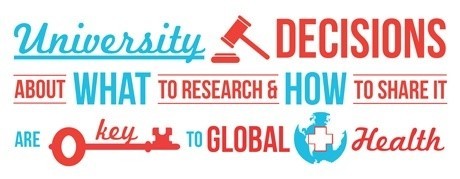Co-authored with Merith Basey (Executive Director, Universities Allied for Essential Medicines), Warren Kaplan (Clinical Assistant Professor, Global Health Center for Global Health & Development,Boston University School of Public Health)
This year at the Consortium of Universities for Global Health Conference, Atul Gawande, surgeon, writer and public health researcher, made the following statement during his opening remarks:
"There are more than 60,000 known ways the bodies' 13 organ systems can go wrong with over 4000 medical procedures and 6000 medicines found in the last 100 years to treat and prevent those failures. What is Global Health? It is taking this knowledge gained and distributing it to people all over the world."
Universities are positioned as institutions devoted to the research and discovery of innovations for the benefit of the public that supports them. Many are nonprofit, public-interest institutions heavily funded by government grants and taxpayer-funded sources. As the new generation of global health leaders, today's students and medical researchers have the ability to support as well as pressure these institutions to fulfill their commitment to the 8 billion plus inhabitants of this world.
Far too often many medicines are made available only to those who can afford them, regardless of need or the benefit they were created to provide. The tragic result is that millions of people, mostly in the developing world, die each year simply because they don't have access to medicines that already exist.
On Tuesday, April 21st 2015, Universities Allied for Essential Medicines launched their second University Report Card to hold leading global health institutions accountable to their commitments, but also to present where gaps might lie in the areas of Global Access to new innovations, Innovation and research into neglected diseases and Empowerment of the next generation of global health professionals.
This year also showed an unprecedented level of collaboration and engagement from students and administrators from dozens of universities around the country. For instance, in 2013, Boston University received a disappointing C- on the report card, ranking 35th out of 54 schools surveyed. The results from this year's report card showed Boston University in a much more impressive 6th place out of 59 universities. With a Business School and School of Public Health that were both just ranked 10th in the world according to Business Insider and US News, a UAEM ranking of 35th in global health impact reflected either a need for university improvement or better measurement indicators, or both.
In response to criticisms of the 2013 University Report Card expressed by BU faculty in a Lancet article, the second version of the University Report Card introduces new metrics for scoring not present in the original. Additionally, this year there are two questions that address university policies surrounding the recent Ebola outbreak in West Africa, a crisis that has highlighted in particular the failed pharmaceutical R&D model.
Another modification was the new name, "University Report Card: Global Health Equity and Biomedical Research," which better reflects what it is really measuring: University commitments to ensuring that innovative biomedical research performed in university labs will be accessible to all, and the efforts universities make to educate the next generation of global health leaders.
This project is a major step towards increased much needed dialogues between students, administrators, and researchers. We can also now track university improvement. Rest assured that university administrations will vie to reach first place!
We at Universities Allied for Essential Medicines believe that our institutions have an opportunity and a responsibility to improve global health through our research activities. If those same aspirations for global health were applied across the board to all universities, imagine the impact we would make then. The results of this year's report can be found on the UAEM Global Health Grades website. We should take pride in how our universities have improved, but we should also open discussions as to where gaps can still be filled. We have the opportunity to showcase the ways other universities can follow our example as an institution that prioritizes Global Health Equity and the impact of Biomedical Research. Let's together make this potential impact a reality.
